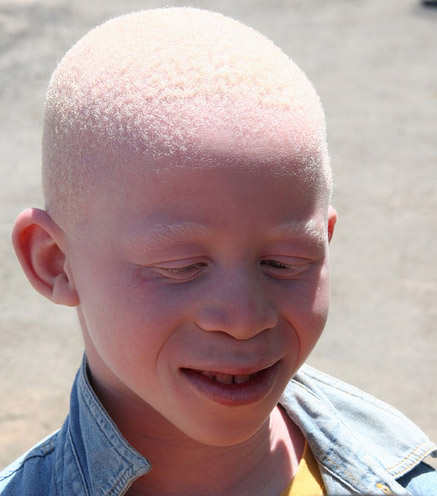There have been calls for greater action to enforce a newly-imposed ban on witch doctors in Tanzania following the abduction of a child whose albinism renders his body parts valuable to proponents of the banned practice.

Albinism is caused when cells called melanocytes fail to produce sufficient eumelanin, the type of melanin responsible for skin pigment
The one-year-old boy was grabbed from his mother in his home in the Geita region of northwestern Tanzania on Sunday, a month after the government announced a nationwide ban on witch doctors who are accused of fuelling a wave of attacks on albinos.
More than 70 albinos, who lack pigment in their skin, hair and eyes, have been murdered in the east African nation in the past decade, according to U.N. figures, many hacked to death and their body parts removed to make charms and spells that witch doctors claim bring good luck and wealth.
Joseph Konyo, Geita police commander, said the boy, Yohana Bahati, was snatched by an armed gang in his home from his mother, Esther Bahati, 30, who was hit with a machete as she tried to protect her son at Ilemela village in Chato district.
“Unfortunately this family resides in a protected forest area … so it was extremely difficult for the police to immediately arrest the suspected robbers,” Konyo told the Thomson Reuters Foundation.
The police, who have launched a manhunt for the boy, said two other albino children in the house were not harmed.
“We have stepped up security in the area to ensure that no one else is hurt,” Konyo said.
This is the second abduction of an albino child in the northwestern area in two months. Pendo Shilinde, a four-year-old girl, was abducted in December by an armed gang accompanied by a traditional healer from her home at Ndami village in Mwanza region. She is still missing. Konyo said in both cases police arrested the father of the abducted child. No charges have been brought and investigations continue.
Vicky Ntetema, executive director of Under The Same Sun, a Canadian non-profit working to defend albinos, said families were often involved in abductions with high prices paid on the black market for the body parts of albinos. She criticised political leaders for failing to support efforts to stop the worsening plight of albinos, including the ban on witch doctors.
“There’s absolutely no political will among leaders to end these macabre killings … what is so special with these (traditional) healers to the extent that our leaders ignore albino killings?” she said.
“Albinism is not a disease. People must understand albinos are normal people like everyone else and the government has a role to play to ensure this education reaches many people since most of the killings involve members of the family.”
Albinism is a congenital disorder which affects about one in 20,000 people worldwide, according to medical authorities. It is, however, more common in sub-Saharan Africa, affecting an estimated one Tanzanian in 1,400.

